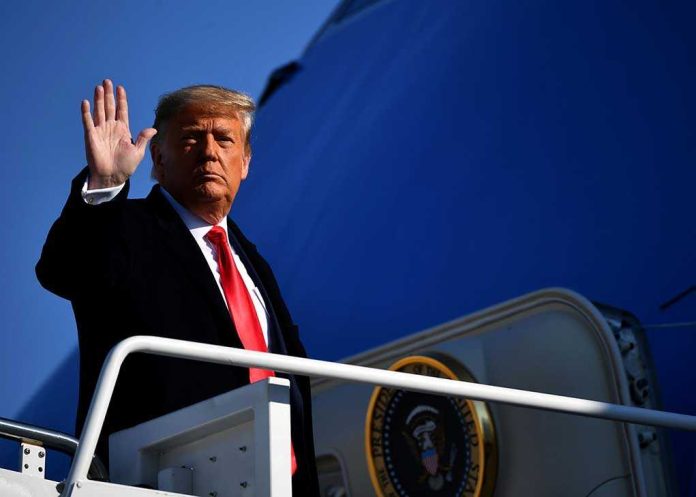
With a single endorsement, Donald Trump has thrown the Virginia governor’s race into a historic, unpredictable, and nationally consequential showdown that’s testing the boundaries of gender, party loyalty, and presidential power.
Story Snapshot
- Trump’s late endorsement of Winsome Earle-Sears electrifies an already unprecedented female vs. female gubernatorial matchup.
- Virginia’s long tradition of opposing the president’s party faces a new test in the Trump era.
- Polling shows Democrat Spanberger with a lead, but Trump’s influence could reshape the race’s trajectory.
- This election’s outcome is poised to ripple far beyond Virginia, signaling shifts in national political tides.
Trump’s Endorsement Upends a Historic Race
Donald Trump’s official support for Winsome Earle-Sears, announced just days before Virginia’s 2025 gubernatorial election, instantly reframed the contest’s stakes. The race had already commanded national attention: for the first time, both major parties nominated female candidates—Republican Earle-Sears and Democrat Abigail Spanberger—marking a milestone for gender representation in a state with a storied political lineage. Trump’s decision to weigh in at this late hour is widely seen as a strategic move, designed not only to energize Republican loyalists but to test the magnetic pull of his endorsement in a state that voted blue in the last presidential race.
Virginia’s electorate now faces an unusual dilemma: does the state’s tradition of electing governors from the opposite party of the sitting president hold in the face of Trump’s disruptive political style? The contest is more than a referendum on two candidates—it’s a barometer of Trump’s residual influence and a potential preview of the Republican Party’s trajectory into 2026 and beyond.
Historic Firsts and Political Power Plays
Winsome Earle-Sears, the current Lieutenant Governor and a trailblazer as the first Jamaican-born woman to serve statewide, embodies the Republican establishment’s hope for both continuity and renewal. Her rival, Abigail Spanberger, a former CIA officer and congresswoman, leverages her national security credentials and centrist reputation to court independents. Both women secured their nominations without opposition, underscoring the clarity of their party’s visions and the urgency of their missions.
The backdrop to this high-stakes face-off is Virginia’s quirky but consistent habit: since 1977, the state has almost always chosen a governor from the party not in the White House, with only one exception in 2013. Now, with Democrat Kamala Harris in the Oval Office and Spanberger leading in polls by ten points, the question looms—can Trump’s endorsement rewrite Virginia’s political playbook, or will the state’s old instincts prevail?
The Stakes: Beyond Gender and Party
This Virginia election is more than symbolic. The governor’s office wields real power over business policy, taxation, and social issues, and the outcome will set the tone for the state’s direction on education, economic development, and public safety. For national observers, the contest also serves as a test of whether Trump’s brand can still mobilize a coalition in a state that increasingly leans Democratic, especially in its suburban and younger populations.
Recent polling paints a competitive landscape, with Spanberger’s advantage driven by strong support from independents and early voters. Yet, Trump’s endorsement, arriving as early voting surges, could ignite Republican turnout and unsettle assumptions about voter behavior. Party strategists on both sides are closely watching for shifts in enthusiasm and turnout, especially as the campaign enters its final fevered stretch.
Ripple Effects and the Road Ahead
The immediate impact of Trump’s move is already being felt in campaign messaging and voter mobilization efforts. Earle-Sears has doubled down on her alignment with Trump-era policies, highlighting her role in the current Republican administration’s legislative successes. Spanberger, meanwhile, frames the contest as a choice between steady, experienced leadership and the volatility of Trump-style politics.
The results on November 4 will echo far beyond Richmond. A Republican victory would signal that Trump’s endorsement remains a potent force even in purple or blue-leaning states, potentially emboldening GOP candidates nationwide. A Democratic win, especially by a significant margin, would reinforce Virginia’s evolving political identity and challenge the narrative of a Trump-dominated Republican resurgence. Either way, the election’s outcome will offer a revealing snapshot of voter priorities, party realignment, and the evolving role of gender in American political life.
Sources:
Wikipedia: 2025 Virginia gubernatorial election
VPM: Who Will Be Virginia’s Next Governor?
Emerson College Polling: Virginia 2025

